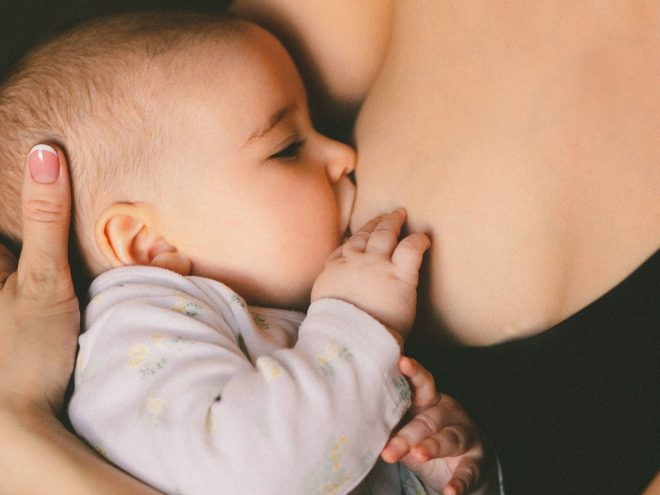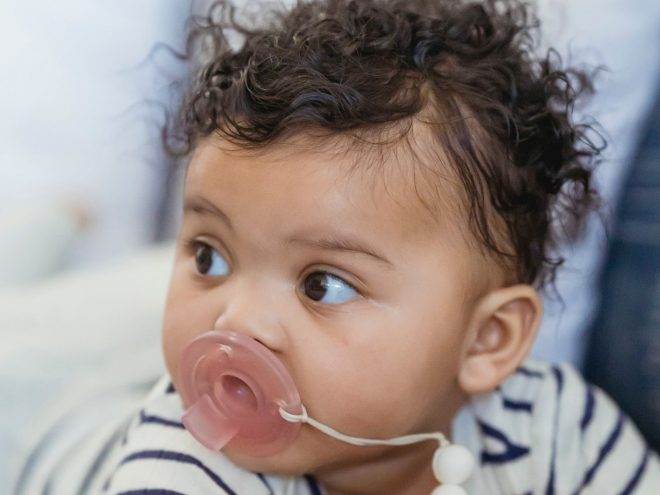I felt lucky when my daughter weaned herself off the boob juice, but she did so as she entered the terrible twos. I nursed my little girl well beyond what the average mom in America says is best — a total of 18 months, and it was completely worth it. Extended breastfeeding offers a multitude of health benefits, and I supplied that nutrition during the “extra” time — not to mention all the extra moments of boob time connection I got. Nursing her wasn’t a walk in the park. It took time for her to decide to take the boob, and her latch was painful — she needed a deeper latch. She and I eventually got the swing of things, but I also had to deal with the joys of cracked nips and awkward pumping. Every few hours, I had a pump or my daughter attached to a boob. No, I wouldn’t trade it for a five-star stay anywhere in the world.
But Why Breastfeed That Long With Those Struggles?
Let’s get to the real question — but why did you breastfeed for that long? No lies here. It was a struggle and a half, but my daughter and I made it through to have a less painful and very fulfilling breastfeeding experience together. Many breastfeeding moms get flack when they continue breastfeeding their child beyond the average window of six months to a year, and you raise eyebrows with a boob out in public when your child’s clearly a year or older. The CDC recommends breastfeeding your child exclusively up to six months, but that’s not realistic for many families who may have latching problems or other issues. Most breastfeeding babies get some breastmilk, but they may also need formula occasionally. Out of the 81.9 percent of babies who ever breastfeed, only 25.5 percent fed exclusively for six months. You know my cons: achy and cracked nips, trouble with the latch and my boobs required to be constantly on-call. When you have a newborn, though, mama’s always on-call. The struggles of breastfeeding moms vary, but the pros are typically very similar. My daughter got all the benefits of nutrition and my attention. That sense of comfort and bonding matters so much for infant development, as their brains grow at a rapid pace. She even recognized the sound of my bra unclasping. I didn’t feel the need to force her off the boob juice when everything else was going so well with her development, and we eased into a natural rhythm after those initial struggles.
The Breastfeeding Hype Shouldn’t Stop — Here’s Why
I knew in my gut that I wanted to breastfeed my daughter. I wanted that connection, and that decision grew firmer the more I read about the nutritional benefits of breastfeeding. Besides, the vast array of reactions delight me when folks are presented with public boob. Yes, it’s called feeding one’s child. I don’t think breastfeeding is the only choice, and I realize many families believe formula-feeding works best for them. That doesn’t mean anyone should experience shaming. So, why the push for breastfeeding in the media and by experts? The benefits are all real, y’all, based on heaps of research conducted throughout the past few decades. Beyond that, breastfeeding could work as an equalizer for all families, no matter their socioeconomic background. Breastfeeding is free — at least the natural equipment is — and the milk is packed with the nutritional goodness kids need. In relation to the poverty line in 2013, at less than 100 percent, only 38.2 percent of infants breastfed exclusively up to six months compared to higher income levels, capping out at around 70 percent. The numbers for ever breastfeeding were significantly higher — under 100 percent, 72.8 percent ever breastfed. Even among the well-off, horrible maternity leave policies in the U.S. leave families with little time to breastfeed and bond with their child, but the disparities increase the further down the income drain pipe you go. Breastfeeding represents a status symbol of privilege, where families who have access to sound, company-developed maternity leave policies, flexible schedules and job security, for example, have better resources and freedom to nurse. Other mothers remain on the clock and can’t afford to miss work, and their bosses don’t give them breaks. That’s where formula, the milk-sharing economy and advocacy come into play as helpful ways to fill in the gap, but the long-term deficits and ramifications in that child’s health matter more. Just because middle and upper-class parents tire of hearing about the joys and benefits of breastfeeding doesn’t mean it should stop. The promotion of breastfeeding is vital to decrease health disparities among the classes and benefit all. It also pushes for better health care for all, because whether you breastfeed or formula-feed, parents need to afford everything that goes along with their preferred nutritional choice.
An Honest Talk About the Benefits of Extended Breastfeeding
In the last 20 years, increasing advances in technology and medicine have reduced infant death. However, the risks posed to both mother and child still present concerns, which breastfeeding naturally helps to address. Nearly seven million children under age five die annually from typically preventable causes — such as malnutrition — and newborn deaths stand for roughly half of all child deaths under age five. Neonatal mortality would fall significantly if more children started breastfeeding within an hour after their birth. Nearly half of those child deaths were newborns, and the other half were children getting ready to go to preschool and elementary school. They need the nutrition to make the most of their growing minds, but most of all, even kids in the U.S. need breastmilk to survive. In developing countries, 13 percent of children under five would survive, of those who pass away each year, if they had the opportunity to follow optimal breastfeeding practices. Beyond survival, the benefits of extended breastfeeding abound.
Increase Maternal Sensitivity
Even with the struggles and disparities that families face, children benefit from the extension of breastfeeding over a more extended period. A 10-year longitudinal study by the APA followed mothers who practiced extended breastfeeding. These mothers experienced increased maternal sensitivity beyond toddler years, even after the study accounted for such influencing factors of the mother’s education, relationship status, ethnicity, parenting attitudes and neuroticism. Researchers defined maternal sensitivity as “the synchronous timing” of a mother’s ability to respond to her child, flexibility in her behavior, her emotional tone and ability to interpret her child’s cues. The study also results suggested an increase in maternal sensitivity linked to more extended breastfeeding periods. Plus, they included elements of free play alongside breastfeeding, which revealed positive results when these approaches combined.
Improve Health for Both Mother and Child
Formula recipes have significantly improved in recent years for nutritional consumption, but breastfeeding remains associated with a reduced risk in diseases for both mother and child. Women who don’t breastfeed are 27 percent more likely to have ovarian cancer and increasingly likely to have breast cancer. Researchers associate longer periods of breastfeeding with better overall maternal health. Formula-fed children also are at increased risk for respiratory diseases, diarrhea, acute ear infections and other conditions — sudden infant death syndrome is 56 percent more likely to occur in babies who never breastfed. Breastfeeding can also reduce economic and environmental pressures by decreasing the amount of gear you need to own to feed your child — which you only end up throwing away. An older study put the number at between $1000 and $1500 saved annually. That’s money in the bank for your child’s college education.
Support Baby’s Social and Behavioral Development
Previous studies found inconsistencies as to whether breastfeeding for more prolonged periods affected a child socially and behaviorally, but the strengthening of the parent-child bond held real promise, as we now see evidenced. One study found that children who breastfed for more than six months with exclusive breastfeeding in the first three months experienced reduced odds of conduct issues, emotional symptoms and overall difficulties. Adjustments determined that psycho-social development depended more on confounding factors such as birth order or sociodemographic status. Those who breastfed for more than 12 weeks had increased social competence scores. Another study determined that breastfeeding under six months had associations with increased behavioral challenges, but behavior improved every month when breastfed for more than six months. Tada, that’s the power of the boob juice! I didn’t know all that going into breastfeeding my daughter, but the existing research and my intuition convinced me it was the right thing for my little one. My achy, cracked nipples argued with me in the first few months, but I wouldn’t change the fact that we extended breastfeeding for anything.





